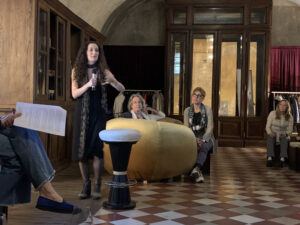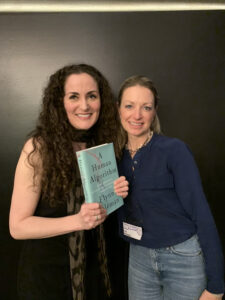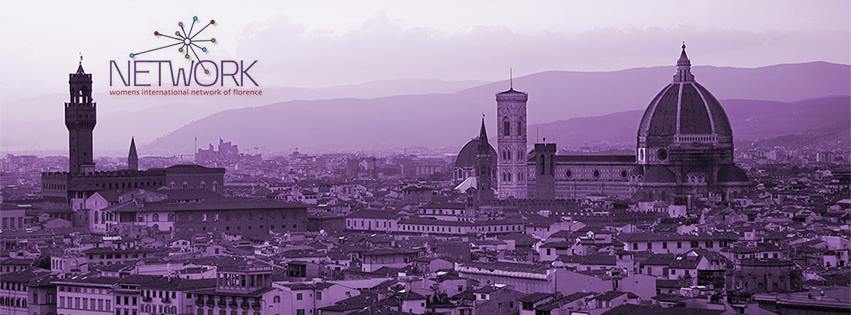April 2023 Meeting speaker recap
‘There are no passengers on starship Earth. We are all the crew.’ – Marshall McLuhan
Going forward together, planning ahead: Coleman’s recipe for a Human Algorithm
by Lisa Robbins

In a riveting talk about AI technology in our lives, Flynn Coleman, author, educator, spokesperson, scholar and advocate, stressed the essential need for collaboration and cooperation as the best way forward.
WIN’s April speaker opened by stating that ‘technology is a mirror for who we are. It can support us, realise our dreams for a better world. It can also bring out the worst in us.’ We’ve all heard stories of traumatized teens exposed in compromising positions or bullied on social media networks; we’ve all interacted with robotic virtual assistants on websites. We watch in horror as students garner top marks on papers they did not research or write and as perfect imitations of artists’ and authors’ creative styles are published via ChatGPT**.
AI controls us ‘Some seventy percent of our transactions and the same percentage of our daily lives is controlled by algorithms.’ Coleman notes. ‘You don’t choose what you buy; algorithms choose for you. They track your online activity and predict what you want, what you will purchase, with close to100% accuracy. Her recent book, A Human Algorithm*, captures the essence of her argument. (An algorithm is a guide, a step-by-step process for completing a task; AI algorithms become computer programs that tell a machine what to do, she reminds us.)
How does one define AI today? ‘It is no one thing’. From its origins when Alan Turing invented the first computer to today’s robot chat box, Instagram ads and sophisticated robotic software capable of independent learning, AI keeps evolving, and spiralling in nebulous directions.
Leaping before we look We rush to embrace the challenge of new technology, build it because we can, rather than because we should, it seems to me. Coleman reminds us that unbridled invention without brakes invites unconscionable end results with dire repercussions. Modern websites do whatever they can to keep the user scrolling. Though the human brain has evolved over the centuries that we have populated the Earth, our minds cannot now keep pace with the new technology. ‘AI tools are now smarter than the human designer who created them, and smarter than the human user who engages with them.’
‘There is no manual, no way to do this, no one power that has all the answers,’ Coleman says. ‘How can legislation keep up? People go where there are jobs. Lawyers are not trained as public speakers, and engineers are not trained in ethics.’ Educators force us to choose too early to between math/science or humanities…but we desperately need to understand both. We are heading toward a dangerous ‘digital authoritarianism’. In Frankenstein, Mary Shelley teaches us it’s not enough to create life. It has to be treated well, nurtured and cultivated, A Human Algorithm states.
 Coleman’s personal passion for human-focused AI was born when she investigated how satellite images could be used to view war destruction. She began to wonder how we might prevent these atrocities from happening. Drawing on her background in the study of human rights and war crimes, Coleman found possible answers in the humanities. This field has so much to teach us about the future of our planet. Lessons from the past can ensure that the future is one that will sustain the planet, one that will afford us healthy, productive fulfilled lives. ‘We can learn to make these (AI) tools more human,’ she insists, adding that animals continue to show us the way. Coleman points to the cleverness of the crow and the octopus, the intricate function of ant colonies and bee hive networks.
Coleman’s personal passion for human-focused AI was born when she investigated how satellite images could be used to view war destruction. She began to wonder how we might prevent these atrocities from happening. Drawing on her background in the study of human rights and war crimes, Coleman found possible answers in the humanities. This field has so much to teach us about the future of our planet. Lessons from the past can ensure that the future is one that will sustain the planet, one that will afford us healthy, productive fulfilled lives. ‘We can learn to make these (AI) tools more human,’ she insists, adding that animals continue to show us the way. Coleman points to the cleverness of the crow and the octopus, the intricate function of ant colonies and bee hive networks.
Working together ‘Today we have the computing power to build things once unimaginable,’ she says. And while the foundations of AI technology were once dominated by mostly white men, future developments and inventions will hail from a more diverse network, judging from contemporary demographics and the global spread of knowledge and investment. That is as it should be. ‘We need to involve everyone, regardless of their race, their genre… we all need to be involved in making AI a force for the good, not just the white men (or the rich global capitalists). Not that this task is an easy one. Every action we take …and all the justice we seek affect others in the gossamer web we all share, her book notes. Living in a world with forms of intelligence superior to our own requires having faith in one another, faith that we can respect and honor all the living things that share our home. We need to move past our penchant to mold intelligent creations solely in our own image, to surmount our fear of bestowing consciousness, intelligence, rights, and dignity upon others. This is our best chance of getting it right with AI.
Going forward requires deep thought, planning Coleman insists that ‘intelligent technology, instilled with our highest values, technology in which we have confidence to help make decisions that are fair and equal to all, is in our best interests and in the best interests of future generations. We need to think about how we design and use AI so that we take moral responsibility,’ for our planet and its residents. ‘We need to ask better questions, bring morality into the picture. How should we “raise” robots? What should we teach them? How do we instill values, morals? What do we tell them about religion?’
Does a marriage of science and humanity sound like a pipe dream? It’s not. Coleman points to the stellar imagery that the James Webb Space Telescope is currently beaming back to the planet. The Webb uses primarily infrared light to peer further back in time than the Hubble telescope ever could. This new space tool is the shining product of cooperation between many countries, proving her case: ‘We all have a type of brilliance; combine this and we can achieve our highest aspirations.’
If you missed this inspiring presentation, here is a TED talk that offers a taste of Coleman’s passion

*bio from WIN’s introduction:
Flynn Coleman is the author of the book, A Human Algorithm, a ground-breaking narrative on the urgency of humanely designed AI and a guidebook to reimagining life in the era of intelligent technology. She has spoken, written, and taught on war crimes, genocide, crimes against humanity, truth and reconciliation commissions, emerging technologies, behavioral economics and behavioral science, political reconciliation, the intersection of human and environmental rights, the future of autonomous weaponry and war, post-conflict and transitional justice, artificial intelligence, gender equity, access to justice and education, and the future of truth, democracy, and humanity. Flynn writes and speaks about what it means to be human, and what it means to be humane.
Flynn is a Fulbright Specialist with the U.S. Department of State, a Henry Luce Scholar, a Council on Foreign Relations Stephen M. Kellen Member, the recipient of the YFU Distinguished Alum Award, and the inaugural recipient of a Women in Sports award. Flynn is also the honoree of the NCP Visionary Award.
She is a contributing writer for such publications as the Los Angeles Times, Foreign Policy, the Boston Globe, the Los Angeles Review of Books, the Irish Times, Literary Hub, Tech Policy Press, HuffPost, Global Citizen, The Next Web, Darling Magazine, and Nautilus Magazine. She wrote the foreword to Liderazgo, Emprendimiento y Género: Motores de la transformación. Her work has been translated into multiple languages and appears in educational textbooks and global campaigns. Flynn has worked with the United Nations, the International Criminal Tribunal for the former Yugoslavia, the United States Federal Government, and with international companies, universities, and human rights organizations around the world.
She has taught at The New School, Parsons School of Design, and was the inaugural fellow at the Grunin Center for Law and Social Entrepreneurship at NYU School of Law. Flynn was the founding teacher at King’s College London Dickson Poon School of Law on redefining success in the law, and is a faculty member at The School of Life and General Assembly. She is also the inaugural advisor of Spring ACT.
Flynn holds a BSFS from Georgetown University, a JD from UC Berkeley School of Law, and an LLM from the London School of Economics and Political Science. She has also studied at La Sorbonne, the University of Cambridge, Trinity College Dublin, La Universidad de Chile, Université Cheikh Anta Diop de Dakar, Senegal, and Université de Genève.
She has lived in Cambodia, Senegal, France, Switzerland, England, Ireland, Italy, Hong Kong, Fiji, the Netherlands, Chile, and the United States. Flynn currently calls New York and Italy home. She speaks five languages, and her wanderings have taken her from helping rebuild homes and schools in New Orleans and Fiji, to distributing gifts to children in Haiti and school supplies in Guatemala and Ethiopia, to spending time with primates in Spain, to teaching How to Make a Difference in the English countryside, to playing soccer in Italy, Cambodia, and Chile, to huffing up Mount Kilimanjaro with her dad, to zodiac boating in Alaska with her mom.
**ChatGPT is a sophisticated AI interface with broad general knowledge. It carries out complicated instructions in natural language and resolves difficult problems accurately. It collects data from the internet and spits it out in essays, term papers that earn top marks, and writes intelligent, engaging articles. It creates website magazines that don’t exist. At present anyone can use it. Italy has recently made news by banning Chat GPT. (nevermind that access to VPN would afford any user of its service).

